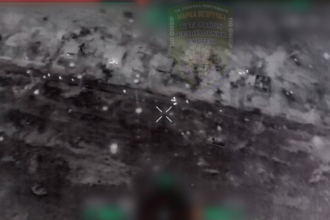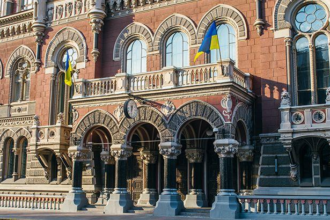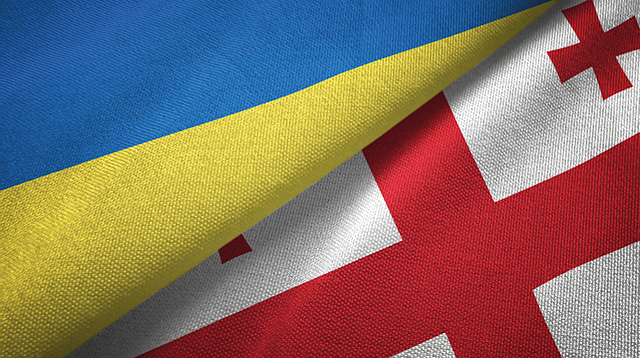After the Russian invasion in Ukraine, a rift began to appear between Georgia and Ukraine. The current trends indicate that the ties will not improve in the near term.
What was once a solid relationship has now become a mess. The reasons for the breakdown of the relationship range from internal politics in Georgia to changes in the regional power balance. Both countries have always felt close because of their similar struggle against Russian military incursions and Moscow’s approach to its spheres of influence. Both countries border the Black Sea and are therefore two bastions against Russia’s ambitions to dominate this sea.
It was therefore only natural that Kyiv and Tbilisi would cooperate and become close allies, creating a arc along Russia’s southern and south-western border that could resist the imperial pressure. GUAM was created to reflect these aspirations. The organization, originally called GUUAM, which aimed to develop democracy and economic progress was established in 1997. It served as one the first regional models connecting the Black and Caspian Seas, with a primary economic role.
The newly independent states wanted to take a geopolitical lead. The West appeared to be powerful, while Russia seemed weak. Geographically, the participant states were interesting. Azerbaijan, which controls most of the northern Black Sea’s littoral and is a crucial starting point for trade and resource corridors, and Georgia, which serves as a connection between the two seas, were the three participants in the project. GUAM members had a common goal of limiting Russian geopolitical power by being able export/dispose of their own resources on world markets, and not to Russia.
The project did not materialize. The member states were heavily dependent on Russian economic, militaristic, and political generosity. This situation limited GUAM’s effectiveness. Uzbekistan, for example, withdrew in 2005 from the project, and Georgia, Ukraine Azerbaijan, and Moldova, despite their weaknesses, were unable keep the GUAM project on track. All member states, despite their shared distrust of Russia and lack of coordination in their foreign policy, failed to work together.
The GUAM initiative remained weak and, with the Russian invasion, tensions in Georgian–Ukrainian relations, and the Russian invasion, it could be on the brink of collapse. One of the rules of regional cooperation is that its effectiveness depends on the geopolitical conditions in the region and foreign support. The project was further ruined by the lack of support.
One could argue that the geopolitical environment in the South Caucasus region and around the Black Sea does not favor the reinvigoration GUAM. All member states have strained relations with Russia. Georgia, Ukraine Azerbaijan, and Moldova all host Russian troops.
Deterioration of bilateral ties
Even before the Russian invasion in 2022, there were difficulties in Georgian-Ukrainian relationships. After the 2012 Georgian elections, a number of former Georgian (United National Movement), government members found a second home in Ukraine. The tensions between the countries were always high, but differences were brushed aside as both countries remained under threat from Russian actions, and were united by a common goal: the “Associated Trio”, to achieve EU membership. The unofficial group, which consisted of Georgia, Moldova and Ukraine, was formed to advance a pro-Western agenda. Georgia was the leader in terms of reforms implemented, and overall prospects for EU/NATO membership.
But the February invasion of Ukraine changed everything. Many expected Tbilisi would openly support Kyiv. The Georgian government instead chose a more nuanced strategy. Georgia’s geopolitical situation is precarious due to internal pressures and broader geopolitical motives. It was important to pay attention to the development of Ukraine-EU relations, to not anger Russia and to respond to a wider pro-Ukrainian feeling globally and in Georgia. Many remember how Ukrainian President Victor Yushchenko enthusiastically backed Georgia in 2008 and even visited the capital while Russian troops were only 30 kilometers away. Georgian officials were also asked to take similar actions.
Georgia took a big risk by choosing this nuanced strategy. In an era of unanimity in the West against Russia, neutrality can be detrimental to a country aspiring to join NATO or the EU. In fact, hundreds of thousands demanded that the Georgian Government become more supportive of Ukraine. Tbilisi, in fact, has supported Ukraine on international fora. It has sent a large amount of humanitarian aid and offered assistance to Ukrainian refugees.
Yet, a rift is beginning to form between the two countries. Geopolitically speaking, Georgia was concerned that a successful Russian invasion would lead to Moscow demanding a change in Tbilisi’s constitution. This would include the removal of the clause on Georgia’s NATO/EU ambitions. If Georgia refused to comply, Russia could use military force to destroy the Georgian economy and population.
The reticence of the Georgian side in approaching the war in Ukraine was not solely due to the occasional tensions that existed between the two countries, but also because of the wider geopolitical shifts. Tbilisi believes that the balance of power has shifted further in favor of Russia in the Black Sea region. As long as this scenario continues, Georgia’s official position on the Ukraine war will remain cautious.
The prospects of both sides joining the EU is another factor that has further divided them. Ukraine was granted candidate status while Georgia received only the European perspective. The “Associated Trio”, therefore, has been unofficially dissolved. Tbilisi has now taken a different course and this is likely to have further negative impacts on its cooperation with Ukraine.
Georgia’s departure from Ukraine is a result of both geopolitical realities and internal politics. The trend is not certain to last, but the official statements of both countries and the ongoing war suggest that tensions will continue as long as Russia maintains control over large swathes in Ukraine it has occupied since Feb.
Emil Avdaliani, a professor of European University, is the Director of Middle East Studies for the Georgian think tank Geocase.
By Emil Avdaliani
Read More @ georgiatoday.ge




